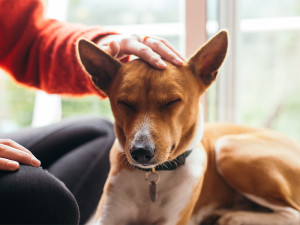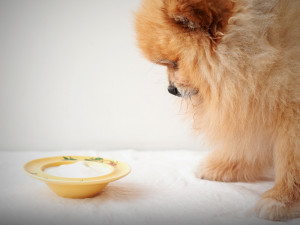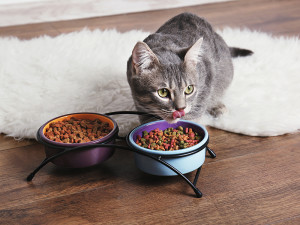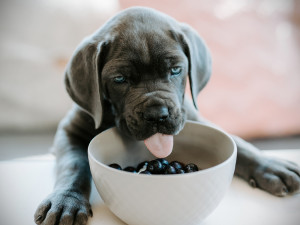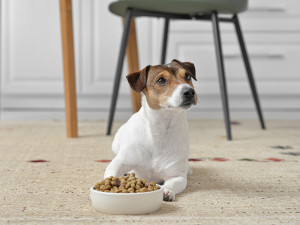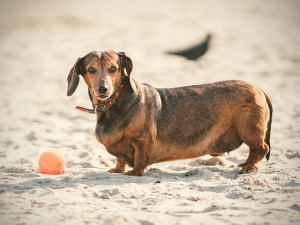Why Do My Dog’s Farts Smell So Bad?
Well, for one thing, you should know about “garbage gut.”
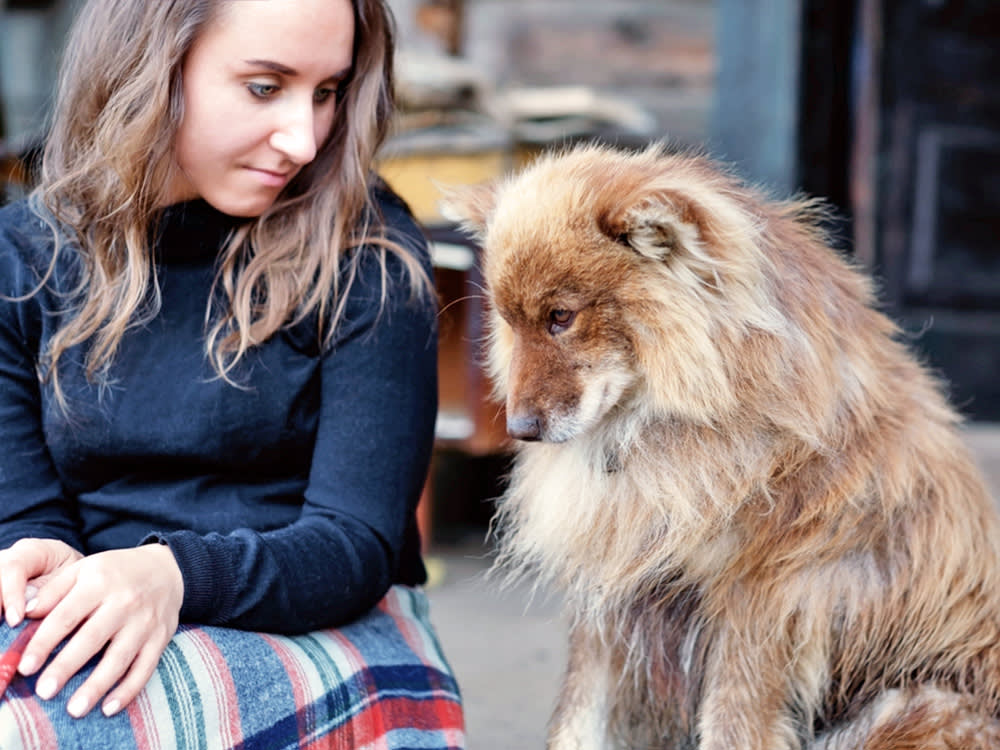
Share Article
In This Article:
Why Do Dogs Fart So Much? Common Causes of Smelly Dog Farts How to Stop Stinky Dog Farts When to Take Your Dog to The Vet For Smelly Farts Frequently Asked Questions
If your dog’s farts make you gag and exit the room, take heart. Farting is a normal part of digestion, and most of the gases produced by the gut don’t have a smell. Most bad gas comes from substances in a dog’s diet that contain sulfur. However, unusually foul stenches paired with excessive farting may indicate underlying medical issues or food intolerances.
Why do dogs fart so much?
You and your dog have probably established an unspoken agreement that when one of you passes gas, nobody gets blamed. There’s no pointing, no teasing, and no standoff of “whoever smelt it, dealt it.” After all, farting is a normal part of digestion, and everyone does it. Flatulence — the fancy way to describe a toot — is the passage of excess gas from the digestive tract.
Is your dog constantly breaking wind? Dog parents can get concerned (or annoyed) if their dog is farting a lot. Possible reasons range from behavioral to underlying health issues. One cause of excess farting is due to a dog swallowing excess air. Dogs that get overexcited or competitive during meal time can eat so fast they swallow large amounts of air along with their meals. Brachycephalic breeds — flat-faced breeds like French Bulldogs, Pugs, and Boxers — breathe through their mouths more often than other dogs. This leads to them swallowing more air and producing more air biscuits.

While excess flatulence can stem from a dog’s behavior, sometimes it can be an indication of an underlying digestive issue. Health issues that may result in increased farting include:
Inflammatory bowel disease (IBD)
Colitis
Food allergies or food intolerances
Pancreatic insufficiency (insufficient production of digestive enzymes by the pancreas)
Dysbiosis (imbalanced bacterial populations in the gut)
Intestinal parasites
Bacterial or viral infections of the intestinal tract
Cancer
Common causes of smelly dog farts
So, you’ve agreed not to judge your dog for playing the butt trumpet, but can the truce hold after you have to ask, “Why do my dog’s farts smell like rotten eggs or sulfur?” Stinky dog farts can ruin any snuggle time, but what causes them to smell so badopens in new tab?
Gas is produced when bacteria break down substances in the gut. In a dog’s intestines, the majority of gases, like nitrogen, oxygen, hydrogen, carbon dioxide, and methane, are odorless. The bad smell of intestinal gas comes from sulfur-containing substances like hydrogen sulfide, methanethiol, and dimethyl sulfide. In dogs (and people), the smelliest farts are the ones with the highest concentration of hydrogen sulfide. Possible causes for smelly dog farts include:
Foods that are high in sulfur
Certain proteins, grains, and veggies have a higher sulfur content than others. So, if your dog has super stinky farts, skip giving them high-sulfur table foods, like broccoli and cabbage.
Foods that are difficult to digest
Dogs lack the enzymes to break down some complex carbohydrates. This forces bacteria in the gut to work overtime to break down certain foods. The longer it takes for the gut to process a food, the greater the gas production. Some foods, like beans, peas, and fatty cuts of meat, are harder for dogs to digest and can lead to smelly farts.
Digestive disorders
Underlying intestinal conditions can cause dogs to have a hard time breaking down or absorbing nutrients. Conditions like irritable bowel syndrome (IBS) or inflammatory bowel disease (IBD) can cause gastrointestinal issues and result in foul-smelling farts. These farts are often accompanied by other symptoms like vomiting, diarrhea, or weight loss.
Food allergies and sensitivities
Sometimes, dogs simply can’t handle certain foods or ingredients. Some dogs are truly allergic to specific proteins in their diet, leading to inflammation and smelly gas. Others may simply be intolerant and have difficulty digesting certain ingredients. For example, many dogs are lactose intolerant, so eating dairy products can cause gastrointestinal discomfort and smelly gas.
Dietary indiscretion
Dogs can develop “garbage gut” by ingesting trash, spoiled food, raw meat, dead carcasses, or waste from other animals. Along with eating something really gross, dogs also ingest the bacteria contaminating that really gross thing. This bacteria can wreak havoc on a dog’s gut, leading to foul-smelling flatulence, vomiting, diarrhea, and abdominal discomfort.
Intestinal parasites
Intestinal parasites, like roundworms, Giardia and Coccidia, can cause significant inflammation in the gut, leading to increased flatulence.
How to stop stinky dog farts
If your dog keeps cutting the cheese, there are some steps you can take to try to save your sense of smell.
Decrease aerophagia
Aerophagia is the medical term for swallowed air. Dog parents can try to limit the amount of air their pup gulps down, especially during meal time. Slow feeders or food puzzles can slow some dogs down. Small, frequent meals can help prevent large amounts of gas from accumulating at one time. Mixing wet food with dry kibble may also help limit air swallowing.
Walk your dog after meals
Gas production is at its highest around 30 minutes after eating. Dog parents can strategically walk their dog during prime farting time so that the toots are released outside.
Limit hard-to-digest foods
Try to cut down on smelly farts by steering clear of high-sulfur table scraps, treats with lactose, or fruit-based treats.
Consider trying probiotics
Dog parents can give their pups probiotics in an effort to restore the balance of good bacteria in their dog’s gut, improving digestion and reducing unwanted gas. Make sure to choose probiotics that are reputable and formulated for dogs.
Stick to easily digestible foods
Commercial diets in which rice is the primary carbohydrate can be easier to digest than other diets. Your vet may also recommend switching your dog to a low residue/high digestibility diet. A prescription may be required for these diets.
Keep up with vet visits
Make sure your dog is up to date on preventative care to avoid intestinal parasites that can cause gastrointestinal issues. If your dog develops bad gas along with other symptoms, talk to your vet to see if diagnostics are in order. Early diagnosis can help your dog feel better before underlying issues become severe.
When to take your dog to the vet for smelly farts
Some dog parents may be wondering when smelly farts are a nuisance versus a medical concern. Don’t be embarrassed about talking to your vet about your dog’s flatulence. Consult with your vet if your dog’s farts:
Are frequent and severe
Cause your dog pain or discomfort
Have worsening odor
Start after a diet change
Accompany other symptoms, like vomiting, diarrhea, poor appetite, or weight loss
FAQs (People also ask):
Why do dogs fart?
A dog fart is the result of gas accumulation in the stomach and intestines, which is a normal part of digestion. Some dogs may fart more often if they swallow excess air while eating or have underlying digestive issues.
What foods cause bad farts in dogs?
Bad-smelling farts in dogs are often the result of hydrogen sulfide, a sulfur-containing gas produced by gut bacteria while breaking down certain foods. Foods that are high in sulfur include broccoli, cauliflower, cabbage, and some fatty meats.
Should I change my dog’s food if he farts a lot?
If your dog farts a lot, you may consider a diet change. Be sure to change your dog’s food gradually (over a week or so) to avoid causing stomach upset. If your dog farts a lot regardless of diet, talk to your vet about possible digestive issues.
References:

Dr. Alycia Washington, DVM, MS
Alycia Washington is a small-animal emergency veterinarian with over 10 years of experience based in North Carolina. She works as a relief veterinarianopens in new tab and provides services to numerous emergency and specialty hospitals. She also works as a veterinary writer with a focus on educating pet parents.
Related articles
![Puppy eating a bowl of blueberries]()
10 Superfoods You Should Share With Your New Dog
From kale to quinoa, these nutrient-packed picks deserve a spot in your dog’s food bowl.
![A person giving a banana to a dog.]()
10 Fruits and Vegetables That Your Dog Can Feast On
Indulge your pup (safely) with these delicious and healthy snacks.
![A black dog with a tilted head looks attentively at the camera while sitting in grass.]()
Is My Dog’s Poop Normal?
From bloody poop to diarrhea—all your dog’s poop problems explained.
![A dog sitting on the floor with a bowl of kibble.]()
Everything You Need to Know About Your Dog’s Gut Microbiome
Microscopic organisms may reveal pathways to better health for your pet.
![An obese dachshund dog plays with a rubber ball on a sandy beach]()
What to Know When Your Vet Says Your Dog Is Overweight
Don’t take it personally — even if that’s hard to do.
![feeding black dog rice water to help relieve diarrhea]()
Vet-Approved Diarrhea Treatments
Shudder. It happens to all of us.

